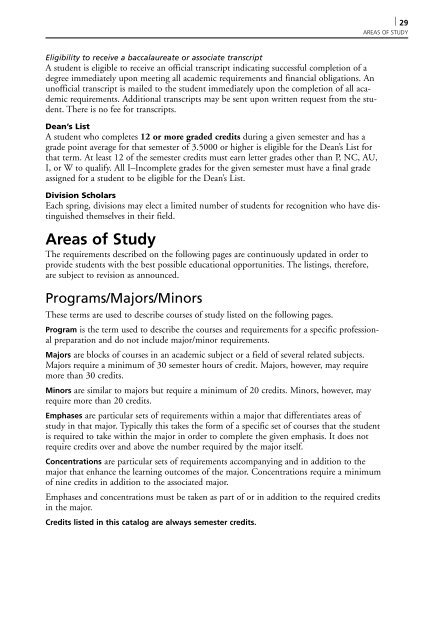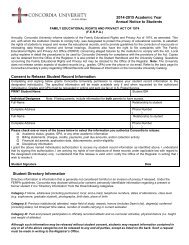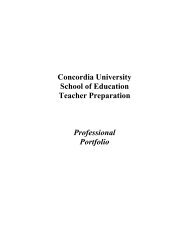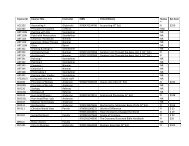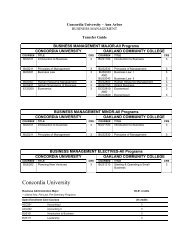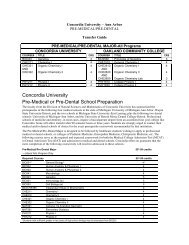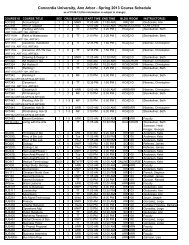2006â2007 Academic Catalog - Concordia University Ann Arbor
2006â2007 Academic Catalog - Concordia University Ann Arbor
2006â2007 Academic Catalog - Concordia University Ann Arbor
Create successful ePaper yourself
Turn your PDF publications into a flip-book with our unique Google optimized e-Paper software.
| 29<br />
AREAS OF STUDY<br />
Eligibility to receive a baccalaureate or associate transcript<br />
A student is eligible to receive an official transcript indicating successful completion of a<br />
degree immediately upon meeting all academic requirements and financial obligations. An<br />
unofficial transcript is mailed to the student immediately upon the completion of all academic<br />
requirements. Additional transcripts may be sent upon written request from the student.<br />
There is no fee for transcripts.<br />
Dean’s List<br />
A student who completes 12 or more graded credits during a given semester and has a<br />
grade point average for that semester of 3.5000 or higher is eligible for the Dean’s List for<br />
that term. At least 12 of the semester credits must earn letter grades other than P, NC, AU,<br />
I, or W to qualify. All I–Incomplete grades for the given semester must have a final grade<br />
assigned for a student to be eligible for the Dean’s List.<br />
Division Scholars<br />
Each spring, divisions may elect a limited number of students for recognition who have distinguished<br />
themselves in their field.<br />
Areas of Study<br />
The requirements described on the following pages are continuously updated in order to<br />
provide students with the best possible educational opportunities. The listings, therefore,<br />
are subject to revision as announced.<br />
Programs/Majors/Minors<br />
These terms are used to describe courses of study listed on the following pages.<br />
Program is the term used to describe the courses and requirements for a specific professional<br />
preparation and do not include major/minor requirements.<br />
Majors are blocks of courses in an academic subject or a field of several related subjects.<br />
Majors require a minimum of 30 semester hours of credit. Majors, however, may require<br />
more than 30 credits.<br />
Minors are similar to majors but require a minimum of 20 credits. Minors, however, may<br />
require more than 20 credits.<br />
Emphases are particular sets of requirements within a major that differentiates areas of<br />
study in that major. Typically this takes the form of a specific set of courses that the student<br />
is required to take within the major in order to complete the given emphasis. It does not<br />
require credits over and above the number required by the major itself.<br />
Concentrations are particular sets of requirements accompanying and in addition to the<br />
major that enhance the learning outcomes of the major. Concentrations require a minimum<br />
of nine credits in addition to the associated major.<br />
Emphases and concentrations must be taken as part of or in addition to the required credits<br />
in the major.<br />
Credits listed in this catalog are always semester credits.


